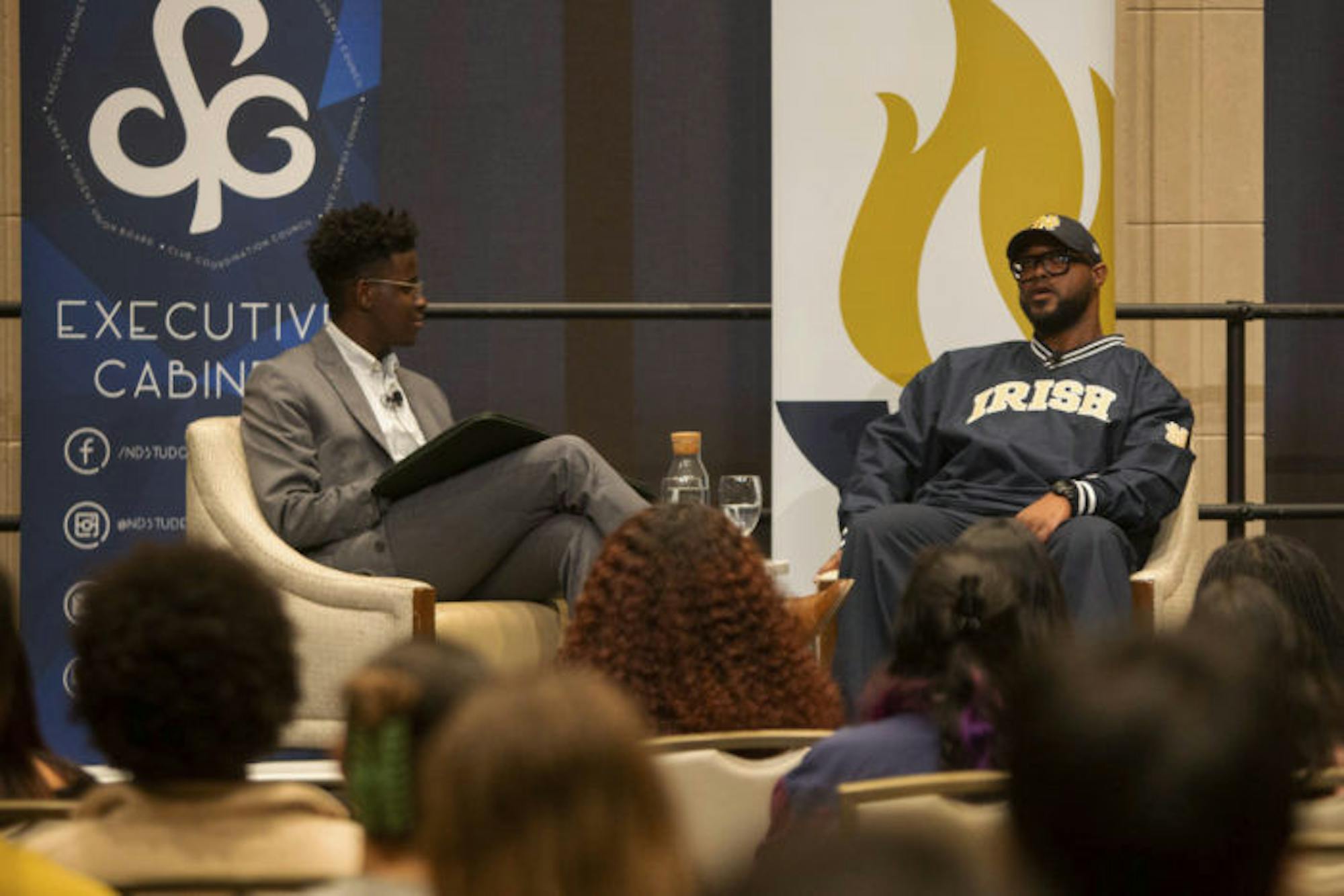Terrence Floyd, brother of the late George Floyd and founder of the nonprofit We Are Floyd, discussed the fight for racial justice and his hopes for the future of America in a conversation with student body president Allan Njomo on Wednesday evening.
The event was hosted by and part of Notre Dame student government’s department of diversity and inclusion and the Klau Center for Civil and Human Rights, with support from the Office of Multicultural Student Programs and Services. The event was open to members of the Notre Dame community with limited seating in Dahnke Ballroom and a virtual attendance option via Zoom.
The event was introduced by student government’s director of diversity and inclusion Amaya Medeiros and was moderated by student body president Allan Njomo.
Njomo began by asking Floyd if America was where he expected it to be eighteen months after his brother’s death.
“As far as us being where we need to be, I don’t see it being where we need to be, but I see it getting there,” Floyd said. “Some progress is better than no progress, and I see the changes in people and their mindsets. That’s what we can ask for right now.”
Floyd spoke of his hopes that students will see real racial justice in America during their lifetime.
“We’ll have a better future because you’re actually doing [the work] now,” Floyd said. “You’re not just in school to be in school, you’re in school to make a difference in yourselves, your family, your future and your future children and grandchildren.”
He thanked young people for protesting in the wake of his brother’s death last summer and commended the younger generation for stepping up on the front lines in the struggle for racial justice. Floyd credited last summer’s wave of activism for the guilty verdict Derek Chauvin received in his murder trial.
Floyd also shared his journey of finding forgiveness for Derek Chauvin in the aftermath of his conviction.
“A lot of people wonder why, but I forgive Chauvin,” Floyd said. “Do I like what he did? No, but I will not be able to do the work that I need to do and make the change that I need to make for my culture, for my community, if I hold that pain. So, therefore I forgive him; I release that from me.”
When a later question from the audience asked him how exactly he could forgive his brother’s killer, Floyd answered, “Forgiveness is not for the person, it’s for you. If I go around talking about love, and still hold that hate in my heart, what do they call that? A hypocrite.”
Njomo and Floyd both stressed the importance of listening to Black people’s experiences with the police and not discounting them.
“They make it seem like you’re crazy,” Floyd said. “But we want you to understand that this happens to us, and I have a few friends that have seen it and they understand now.”
When Njomo asked about Floyd’s recommendations on police reform policies, Floyd was quick to remind everyone that the identity of a police officer is just an occupation, and people should not be discounted because of the jobs they hold. He went on to discuss the narratives placed on minority communities by police officers and how that can affect attitudes toward policing in different communities.
“The police act the way they act because of what they’ve heard about the community they’re sent into,” he said. “If they’re sent into a suburb area, would they have itchy trigger fingers? No. But once they go into the urban areas, they got their hands on their guns, ready to shoot, because of what they heard.”
He urged the Black community to take back the narratives placed upon them and reclaim the respect that has long been missing from their interactions with the police. Floyd reminded the audience that they’re more powerful when they’re together, and they can only stay strong through community.
Floyd also urged rethinking narratives that children are taught about racism and police violence because it is such a complex issue. He advocated for changing the system from the inside, referencing a friend who is working at the NYPD to try and change policing from within the system.
“Don’t teach them police brutality, teach them to change the narrative,” Floyd said.
He spoke of restoring the relationships between police officers and the communities they serve. He recalled how police officers would play with children on the playground when he was a child. Floyd emphasized his plan is to work with existing police departments to reform the system, as opposed to starting a new system from scratch.
“I don’t want to see another son or daughter go down like that and not get justice, I don’t want to see that,” he said. “So if I can do my part and change the narrative, and help change the organization, then I’m all for it.”
Njomo turned the conversation to Floyd’s nonprofit organization, We Are Floyd, to discuss its mission statement and work. Floyd spoke about how his organization’s goal is to change the narrative for the Black community and bring awareness about how they can use their power to make real change in their communities, by doing everything from voting all the way down the ballot to filling out the census to paying attention to local politics. Additionally, the organizations focuses on mental health initiatives, by working against the stigma of mental illness and asking for help.
Above all else, Floyd stressed one message — love.
“Just continue the love,” he said. “Hate? It’s easy to hate someone and walk away from them, never having to deal with that person again. But it takes a big person to love someone unconditionally.”













